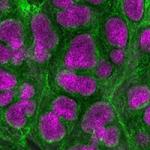
Research Topics
The goal of our laboratory is to identify and characterize the molecular machines and pathways necessary for the development and maintenance of the inner ear. For the past 20 years, we have contributed to the understanding of the exquisite anatomical and physiological complexity of the inner ear by identifying many of the defective genes causing deafness ("deafness genes") in humans and by studying their biological functions in animal models. We continue to ascertain large families segregating deafness in order to identify novel deafness chromosomal loci and genes.
The five interrelated research goals of the Section on Human Genetics are:
- Ascertain large families segregating deafness.
- Map genes for inherited forms of human syndromic and nonsyndromic deafness.
- Identify mutant genes associated with deafness using whole exome and genome sequencing.
- Engineer animal models that mimic human deafness to access pathophysiology.
- Reveal the pathophysiology and wild type functions of "deafness genes."
Improved understanding of the mutated genes will provide important information on hearing and brain processing. The identification of the relevant genes will also permit early and more accurate diagnosis for certain forms of hereditary hearing and communication impairments.
Biography
Dr. Friedman received a B.S. and his Ph.D. from the University of Michigan where he worked with Tahir Mohammed Rizki on the molecular genetics of purine metabolism in Drosophila. After postdoctoral work (studying galactosemia in humans) at the National Institute of Mental Health, he became a faculty member in the Department of Zoology and the Department of Pediatrics and Human Development at Michigan State University. For five years he was also the Director of the Interdepartmental Graduate Program in Genetics. In 1996, he joined NIDCD as the Chief, Laboratory of Molecular Genetics. Dr. Friedman's Section on Human Genetics at the NIDCD studies hereditary hearing loss and Usher Syndrome in humans and mouse models. His laboratory also studies the functions (cell biology and biochemistry) of proteins encoded by genes associated with deafness.
Selected Publications
- Belyantseva IA, Liu C, Dragich AK, Miyoshi T, Inagaki S, Imtiaz A, Tona R, Zuluaga-Osorio KS, Hadi S, Wilson E, Morozko E, Olszewski R, Yousaf R, Sokolova Y, Riordan GP, Aston SA, Rehman AU, Fenollar Ferrer C, Wisniewski J, Gu S, Nayak G, Goodyear RJ, Li J, Krey JF, Wafa T, Faridi R, Adadey SM, Drummond M, Perrin B, Winkler DC, Starost MF, Cheng H, Fitzgerald T, Richardson GP, Dong L, Barr-Gillespie PG, Hoa M, Frolenkov GI, Friedman TB, Zhao B. Taperin bundles F-actin at stereocilia pivot points enabling optimal lifelong mechanosensitivity. J Cell Biol. 2025;224(8).
- Tona R, Inagaki S, Ishibashi Y, Faridi R, Yousaf R, Roux I, Wilson E, Fenollar-Ferrer C, Chien WW, Belyantseva IA, Friedman TB. Interaction between the TBC1D24 TLDc domain and the KIBRA C2 domain is disrupted by two epilepsy-associated TBC1D24 missense variants. J Biol Chem. 2024;300(9):107725.
- Nakano Y, Kelly MC, Rehman AU, Boger ET, Morell RJ, Kelley MW, Friedman TB, Bánfi B. Defects in the Alternative Splicing-Dependent Regulation of REST Cause Deafness. Cell. 2018;174(3):536-548.e21.
- Moreland ZG, Jiang F, Aguilar C, Barzik M, Gong R, Behnammanesh G, Park J, Shams A, Faaborg-Andersen C, Werth JC, Harley R, Sutton DC, Heidings JB, Cole SM, Parker A, Morse S, Wilson E, Takagi Y, Sellers JR, Brown SDM, Friedman TB, Alushin GM, Bowl MR, Bird JE. Myosin-based nucleation of actin filaments contributes to stereocilia development critical for hearing. Nat Commun. 2025;16(1):947.
- Faridi R, Yousaf R, Gu S, Inagaki S, Turriff AE, Pelstring K, Guan B, Naik A, Griffith AJ, Adadey SM, Aboagye ET, Awandare GA, Morell RJ, Tsilou E, Noyes AG, Sulmonte LAG, Wonkam A, Schrauwen I, Leal SM, Azaiez H, Brewer CC, Riazuddin S, Hufnagel RB, Hoa M, Zein WM, de Dios JK, Friedman TB. Variants of LRP2, encoding a multifunctional cell-surface endocytic receptor, associated with hearing loss and retinal dystrophy. Clin Genet. 2023;103(6):699-703.
Related Scientific Focus Areas




Molecular Biology and Biochemistry
View additional Principal Investigators in Molecular Biology and Biochemistry

This page was last updated on Tuesday, September 2, 2025